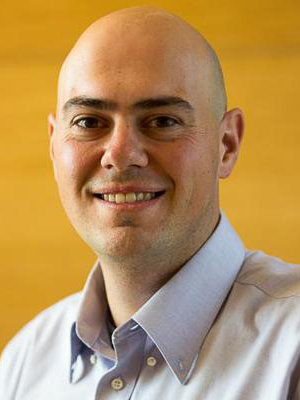Meet our speakers for this year's symposium. Back to agenda.
LaVerne L. Brown, Ph.D.
Program Director, Chair, Trans-NIH Resilience Working Group, Office of Dietary Supplements. National Institutes of Health
 Dr. LaVerne Brown is currently a program director at the Office of Dietary Supplements where she is interested in research that explores the impact of dietary supplement use on resilience and health in diverse populations. As chair of the Trans-NIH Resilience working group, Dr. Brown’s portfolio focuses on elucidating biochemical mediators of resilience to help gain a better understanding of how growth and/or adaptive responses to environmental and biological stressors may impact nutrient status and overall health status in individuals.
Dr. LaVerne Brown is currently a program director at the Office of Dietary Supplements where she is interested in research that explores the impact of dietary supplement use on resilience and health in diverse populations. As chair of the Trans-NIH Resilience working group, Dr. Brown’s portfolio focuses on elucidating biochemical mediators of resilience to help gain a better understanding of how growth and/or adaptive responses to environmental and biological stressors may impact nutrient status and overall health status in individuals.
Dr. Brown first joined ODS as an American Association for the Advancement of Science (AAAS) Science & Technology Policy Fellow in August 2016. In this role, she led a project to explore the vitamin D paradox in Black Americans. Black Americans represent a population that is typically under-sampled in scientific investigations; and the paradox is that, despite markedly low measures of vitamin D status in Black Americans, the incidence of falls, fractures, or osteopenia are significantly lower compared to White American counterparts with similar vitamin D status. A 2017 forum on the topic (which Dr. Brown organized in collaboration with the National Institute on Minority Health and Health Disparities, National Institutes on Aging, and National Institute of Diabetes and Digestive and Kidney Diseases) provided insight into the state of the science with respect to key knowledge gaps impacting vitamin D status and bone health. There was agreement among the panelists that Black Americans gain no skeletal benefits from high doses of vitamin D supplementation, and that high levels of the biomarker of vitamin D status, serum 25-hydroxyvitamin D, in this population are almost certain to result in adverse effects.
Dr. Brown received her B.S. degree in chemistry from Old Dominion University, her Ph.D. in organic/natural products chemistry from Virginia Commonwealth University, and post-doctoral training in medicinal chemistry at the National Institute on Drug Abuse at NIH. She is a former associate professor of medicinal and organic chemistry; and her research interests have included the isolation and chemical characterization of active molecules from natural products, as well as the design and synthesis of novel small molecules to better understand the role of nicotinic acetylcholine receptors in neurological disorders.
(Ski) Floyd H. Chilton, Ph.D.
Professor, School of Nutritional Sciences and Wellness, Director, The Precision Wellness Initiative, University of Arizona
 Dr. Floyd “Ski” H. Chilton is passionate about providing solutions to overcome physical and emotional suffering so that people can live better, more joyful lives. He is a successful innovator in a wide range of areas including an academic professor, an entrepreneur, and an inventor. Dr. Chilton is widely recognized in academia and industry for his work on nutrition in the context of variation in the human genome, and he has been a pioneer in the areas of personalized or precision nutrition and wellness.
Dr. Floyd “Ski” H. Chilton is passionate about providing solutions to overcome physical and emotional suffering so that people can live better, more joyful lives. He is a successful innovator in a wide range of areas including an academic professor, an entrepreneur, and an inventor. Dr. Chilton is widely recognized in academia and industry for his work on nutrition in the context of variation in the human genome, and he has been a pioneer in the areas of personalized or precision nutrition and wellness.
Precision nutrition and wellness explores the relationship between an individual’s genetics, epigenetics, microbiome, metabolism, diet, lifestyle, and behavior with the ultimate goal of developing tools that predict and prevent diseases instead of racing to cure disease after a diagnosis. These complex individualized data are acquired and then integrated using data science and applied mathematics tools such as machine learning and artificial intelligence. This in turn can leads to targeted inventions that address nutrition, lifestyle, and other traditional and integrative therapies along with ways to predict personalized responses and outcomes to these interventions.
Much of Dr. Chilton’s work over the past decade has focused on how individualize genetic variation interacts with human diets (especially the modern western diet) to drive inflammation and inflammatory disorders (including cardiovascular disease and cancer), as well as psychiatric/developmental disorders (ADHD, autism spectrum disorder, and depression). Of particular significance are his efforts to address health disparities in different populations and the potential role of gene-diet interactions in driving these disparities.
In addition to his research, Dr. Chilton has also had the opportunity to touch hundreds of thousands of lives as an author of five lay books focused on nutrition, diet, and physical and mental health. These books include Inflammation Nation (Simon and Schuster), Win the War Within (Rodale), The Gene Smart Diet (Rodale) and Made to Crave Action Plan (Zondervan). His most recent book, The Rewired Brain (Baker) addresses the issue of the unconscious mind, its capacity to negatively impact our lives, and how thought patterns induce genetic (epigenetic) changes that alter brain circuitry.
Dr. Chilton has won numerous awards for his work, including the Alumni Achievement Award at Western Carolina University, the Denham Harmon Outstanding Research Achievement Award from the American College for Advancement of Medicine, the 2016 Established Investigator Award at Wake Forest School of Medicine and the Outstanding Research Impact Award at the University of Arizona. Dr. Chilton has published over 160 scientific articles and has had 40 years of continuous funding from the National Institutes of Health.
Emily Ho, Ph.D.
Endowed Chair and Director, Linus Pauling Institute
Professor, College of Public Health and Human Sciences, Oregon State University
 Emily Ho, PhD is the Endowed Chair and Director of the Linus Pauling Institute, and former Director of the Moore Family Center for Whole Grain Foods, Nutrition & Preventive Health. She is also a full professor, in the College of Public Health and Human Sciences at Oregon State University. Dr. Ho obtained her BS in Nutritional Sciences at the University of Guelph, Ontario, Canada, obtained her doctorate in Nutrition Sciences at Ohio State University in 2000. After a postdoctoral fellowship with Dr. Bruce Ames, at the University of California, Berkeley, she joined the nutrition faculty at Oregon State University in 2003. Her research focuses on understanding the mechanisms by which nutrient status and healthy foods affect the initiation and/or progression of chronic diseases.
Emily Ho, PhD is the Endowed Chair and Director of the Linus Pauling Institute, and former Director of the Moore Family Center for Whole Grain Foods, Nutrition & Preventive Health. She is also a full professor, in the College of Public Health and Human Sciences at Oregon State University. Dr. Ho obtained her BS in Nutritional Sciences at the University of Guelph, Ontario, Canada, obtained her doctorate in Nutrition Sciences at Ohio State University in 2000. After a postdoctoral fellowship with Dr. Bruce Ames, at the University of California, Berkeley, she joined the nutrition faculty at Oregon State University in 2003. Her research focuses on understanding the mechanisms by which nutrient status and healthy foods affect the initiation and/or progression of chronic diseases.
An important strength to her approach in her research is maintaining a mechanistic focus on diet/environment interactions, and encouraging to work in multi-disciplinary teams to facilitate the translation of cellular mechanistic studies to impact human populations. Her work has helped drive dietary requirements and recommendations for micronutrients such as zinc for communities with susceptibility to poor nutrition. She also has strong interest in phytochemicals derived from cruciferous vegetables in cancer prevention. She has strong commitment to engaging and facilitating nutrition and diet-focused translational research projects with basic scientists, clinicians, policy-makers and communities, and involving experiential learning with students and postdoctoral researchers.
Stephen R. Lindemann, Ph.D.
Assistant Professor of Food Science and Nutrition Science, Purdue University
 Steve Lindemann performed his undergraduate work in the Department of Biological Sciences at Purdue University, earning a B.S. with specializations in microbiology, molecular biology, biochemistry and genetics in 2004. He went on to the University of Iowa Carver College of Medicine, where he completed his Ph.D. with Dr. Bradley D. Jones in 2010 on the virulence genetics of the causative agent of rabbit fever, Francisella tularensis. Subsequently, he performed his post-doctoral research with Dr. James K. Fredrickson at Pacific Northwest National Laboratory on systems biology and metabolic interactions in environmental microbial communities. He has now taken this molecular microbial ecology approach back to his alma mater, where he now focuses on host-pathogen-commensal interactions within and dietary influences on the human gut microbiome. Specifically, his laboratory focuses on understanding the role of dietary fiber physical and chemical structuring on gut microbial ecology.
Steve Lindemann performed his undergraduate work in the Department of Biological Sciences at Purdue University, earning a B.S. with specializations in microbiology, molecular biology, biochemistry and genetics in 2004. He went on to the University of Iowa Carver College of Medicine, where he completed his Ph.D. with Dr. Bradley D. Jones in 2010 on the virulence genetics of the causative agent of rabbit fever, Francisella tularensis. Subsequently, he performed his post-doctoral research with Dr. James K. Fredrickson at Pacific Northwest National Laboratory on systems biology and metabolic interactions in environmental microbial communities. He has now taken this molecular microbial ecology approach back to his alma mater, where he now focuses on host-pathogen-commensal interactions within and dietary influences on the human gut microbiome. Specifically, his laboratory focuses on understanding the role of dietary fiber physical and chemical structuring on gut microbial ecology.
Susan Mitmesser, Ph.D.
Vice President, Science & Technology, Pharmavite
Chair, Senior Scientific Advisory Council (SSAC), Council for Responsible Nutrition
 Dr. Mitmesser provides scientific leadership at Pharmavite to advance innovation and new product development strategies, and ensure the scientific integrity of all products made under its brand portfolio. She has a passion for nutrition and wellness and leverages her ability to communicate scientific findings to consumers and the marketplace. Dr. Mitmesser brings extensive experience in research and nutrition biochemistry across various industries and sectors, including food, dietary supplements, academia and clinical settings. She serves on the editorial boards of four peer-reviewed journals: Advance Journal of Food Science and Technology, Journal of Pediatric Intensive Care, World Journal of Clinical Pediatrics, and Journal of the International Society of Sports Nutrition. In addition, she has published in many peer-reviewed journals and is a contributing author for book chapters relating to nutrition in adult and pediatric populations. Dr. Mitmesser is an active member of the American Society of Nutrition, the American Association for the Advancement of Science, and the New York Academy of Sciences. She also serves on the Senior Scientific Advisory Council for the Council for Responsible Nutrition. Currently, Dr. Mitmesser is an adjunct professor in the Gerald J. and Dorothy R. Friedman School of Nutrition Science and Policy at Tufts University. She holds a Ph.D. in Nutrition Biochemistry from the University of Nebraska and a Master’s degree from the University of Nebraska Medical Center.
Dr. Mitmesser provides scientific leadership at Pharmavite to advance innovation and new product development strategies, and ensure the scientific integrity of all products made under its brand portfolio. She has a passion for nutrition and wellness and leverages her ability to communicate scientific findings to consumers and the marketplace. Dr. Mitmesser brings extensive experience in research and nutrition biochemistry across various industries and sectors, including food, dietary supplements, academia and clinical settings. She serves on the editorial boards of four peer-reviewed journals: Advance Journal of Food Science and Technology, Journal of Pediatric Intensive Care, World Journal of Clinical Pediatrics, and Journal of the International Society of Sports Nutrition. In addition, she has published in many peer-reviewed journals and is a contributing author for book chapters relating to nutrition in adult and pediatric populations. Dr. Mitmesser is an active member of the American Society of Nutrition, the American Association for the Advancement of Science, and the New York Academy of Sciences. She also serves on the Senior Scientific Advisory Council for the Council for Responsible Nutrition. Currently, Dr. Mitmesser is an adjunct professor in the Gerald J. and Dorothy R. Friedman School of Nutrition Science and Policy at Tufts University. She holds a Ph.D. in Nutrition Biochemistry from the University of Nebraska and a Master’s degree from the University of Nebraska Medical Center.
John W. Newman, Ph.D.
Research Chemist, USDA ARS WHNRC, Associate Adjunct Professor, University of California, Davis
 Dr. Newman is a Research Chemist with the United States Department of Agriculture, Agricultural Research Service at the Western Human Nutrition Research Center in Davis California. He is also an Adjunct Professor with the University of California Davis, Department of Nutrition and Director of the Lipid Mediators Research Laboratory of the UC Davis West Coast Metabolomics Center. He is an expert in analytical chemistry, lipid metabolism and metabolomics with >25 years of experience and >180 peer reviewed manuscripts. He has broad domestic and international collaborations in human nutrition, emphasizing the impact of diet and dietary components on nutritionally sensitive disease risk mediated through bioactive lipids and other endogenous small molecules. More recently, his research has turned to nutritional phenotyping and exploring the variability in responses to dietary interventions, including work with extra virgin olive oil varietals and tree nuts. Learn more here. A complete list of his publications can be found here.
Dr. Newman is a Research Chemist with the United States Department of Agriculture, Agricultural Research Service at the Western Human Nutrition Research Center in Davis California. He is also an Adjunct Professor with the University of California Davis, Department of Nutrition and Director of the Lipid Mediators Research Laboratory of the UC Davis West Coast Metabolomics Center. He is an expert in analytical chemistry, lipid metabolism and metabolomics with >25 years of experience and >180 peer reviewed manuscripts. He has broad domestic and international collaborations in human nutrition, emphasizing the impact of diet and dietary components on nutritionally sensitive disease risk mediated through bioactive lipids and other endogenous small molecules. More recently, his research has turned to nutritional phenotyping and exploring the variability in responses to dietary interventions, including work with extra virgin olive oil varietals and tree nuts. Learn more here. A complete list of his publications can be found here.
Yasmeen Nkrumah-Elie, Ph.D.
Global Director of R&D for External Research, Chromadex
Chair, Science in Session Planning Subcommittee, Senior Scientific Advisory Council (SSAC), Council for Responsible Nutrition
 Yasmeen Nkrumah-Elie has over a decade of experience in molecular nutrition and toxicology research. She completed both her BS in Biological and Agricultural Engineering and her PhD in Pharmaceutical Sciences, specializing in Toxicology, from The Florida A&M University (FAMU). Her dissertation focused on the use of garlic organosulfide compounds to inhibit breast cancer initiation, in vitro. She received her postdoctoral training on the intersection of molecular nutrition and toxicology from Oregon State University, working under the leadership of Drs. Robyn Tanguay and Emily Ho on projects focused on dietary zinc deficiency and arsenic exposure using untargeted metabolomics. Prior to joining ChromaDex, she conducted clinical metabolomics research on asthma patients, managed an obesity research laboratory, and was paramount in initiating foodomics collaborations at the University of Colorado, Anschutz Medical Campus. Dr. Nkrumah-Elie has published research in the areas of toxicology, cancer, nutritional products, micronutrient deficiencies, asthma, and clinical metabolomics. As the Global Director of the award winning ChromaDex External Research Program (CERP), Yasmeen and her team are helping to advance the science of NAD+ and nicotinamide riboside (NR) all over the world. CERP provides preclinical and clinical study material and technical assistance, in-kind, for researchers exploring NAD+ in health and disease. This program is a trailblazer in the dietary supplement space, and Yasmeen hopes other companies will develop similar programs to improve trust and advance scientific integrity in the industry. Dr. Nkrumah-Elie is a member of The American Society for Nutrition, American Physiological Society, Society of Toxicology, Black Women in Science and Engineering, a Senior Scientific Advisory Council for the Council for Responsible Nutrition, and recently joined the Justice, Equity, Diversity, and Inclusion Advisory Board for InformaMarkets. She is passionate about community health and healing and is the Rehearsal Director and Lead Choreographer for the Intergenerational Women’s African Drum and Dance Ensemble (IWADDE) and member of Delta Sigma Theta Sorority, Incorporated.
Yasmeen Nkrumah-Elie has over a decade of experience in molecular nutrition and toxicology research. She completed both her BS in Biological and Agricultural Engineering and her PhD in Pharmaceutical Sciences, specializing in Toxicology, from The Florida A&M University (FAMU). Her dissertation focused on the use of garlic organosulfide compounds to inhibit breast cancer initiation, in vitro. She received her postdoctoral training on the intersection of molecular nutrition and toxicology from Oregon State University, working under the leadership of Drs. Robyn Tanguay and Emily Ho on projects focused on dietary zinc deficiency and arsenic exposure using untargeted metabolomics. Prior to joining ChromaDex, she conducted clinical metabolomics research on asthma patients, managed an obesity research laboratory, and was paramount in initiating foodomics collaborations at the University of Colorado, Anschutz Medical Campus. Dr. Nkrumah-Elie has published research in the areas of toxicology, cancer, nutritional products, micronutrient deficiencies, asthma, and clinical metabolomics. As the Global Director of the award winning ChromaDex External Research Program (CERP), Yasmeen and her team are helping to advance the science of NAD+ and nicotinamide riboside (NR) all over the world. CERP provides preclinical and clinical study material and technical assistance, in-kind, for researchers exploring NAD+ in health and disease. This program is a trailblazer in the dietary supplement space, and Yasmeen hopes other companies will develop similar programs to improve trust and advance scientific integrity in the industry. Dr. Nkrumah-Elie is a member of The American Society for Nutrition, American Physiological Society, Society of Toxicology, Black Women in Science and Engineering, a Senior Scientific Advisory Council for the Council for Responsible Nutrition, and recently joined the Justice, Equity, Diversity, and Inclusion Advisory Board for InformaMarkets. She is passionate about community health and healing and is the Rehearsal Director and Lead Choreographer for the Intergenerational Women’s African Drum and Dance Ensemble (IWADDE) and member of Delta Sigma Theta Sorority, Incorporated.
Andrew Shao, Ph.D.
Senior Vice President, Global Regulatory & Scientific Affairs at ChromaDex, Inc.

Dr. Andrew Shao has spent over two decades in the global nutrition industry, assuming leadership roles in various nutrition, scientific, regulatory and government affairs functions. He currently serves as Sr VP, Global Scientific & Regulatory Affairs for ChromaDex, Inc. where he oversees the company’s scientific, regulatory, research and development and quality functions. Prior to joining ChromaDex Dr. Shao held several leadership positions at Herbalife Nutrition, and served as Sr. VP Scientific & Regulatory Affairs for the Washington, DC-based trade association, the Council for Responsible Nutrition (CRN). Before joining CRN, he was a senior scientist at General Nutrition Corporation (GNC), and previously, in research and development at Kemin.
Dr. Shao is the author or co-author of over 60 peer-reviewed articles, abstracts, trade articles and book chapters and serves on the Editorial Board of several peer-reviewed journals. He is the immediate past Chair of the Sustaining Partners Roundtable of the American Society for Nutrition, and member of the Tufts Nutrition Council.
Dr. Shao holds a doctorate in nutritional biochemistry and master’s in human nutrition science, both from Tufts University, and a bachelor’s in biology from Brandeis University.
Jonathan M. Scott, Ph.D.
Assistant Professor, Department of Military and Emergency Medicine, Consortium for Health and Military Performance (CHAMP)
 Jonathan M. Scott, PhD, RD, CSSD, LD: Dr. Scott is an Assistant Professor in the Department of Military and Emergency Medicine, F. Edward Hébert School of Medicine at the Uniformed Services University (USU) in Bethesda, MD. He conducts research and produces educational materials on a variety of topics related to performance nutrition and dietary supplements for the Department of Defense.
Jonathan M. Scott, PhD, RD, CSSD, LD: Dr. Scott is an Assistant Professor in the Department of Military and Emergency Medicine, F. Edward Hébert School of Medicine at the Uniformed Services University (USU) in Bethesda, MD. He conducts research and produces educational materials on a variety of topics related to performance nutrition and dietary supplements for the Department of Defense.
Dr. Scott completed a Dietetic Internship and a M.S. in Clinical Nutrition from The Ohio State University (2008), and a Ph.D. in Health and Rehabilitation Sciences from The Ohio State University (2012). He has advanced training in sports nutrition and holds the distinction of being a board Certified Specialist in Sports Dietetics.
Prior to his current position at the USU, he was a sports dietitian at The Ohio State University for four years. Since leaving OSU in 2012, he worked as a contract performance dietitian and later as senior scientist, with the Henry M. Jackson Foundation for the Advancement of Military Medicine supporting the Consortium for Health and Military Performance (CHAMP) at USU. He is passionate about the synergistic effects of food, intentional training, and recovery in helping individuals and teams achieve optimal performance.
Barbara Shukitt-Hale, Ph.D.
Research Psychologist, USDA, ARS, Neuroscience and Aging Team, Jean Mayer USDA Human Nutrition Research Center on Aging, Tufts University
 Dr. Barbara Shukitt-Hale is the USDA Staff Scientist in the Laboratory of Neuroscience and Aging, USDA-ARS, Human Nutrition Research Center on Aging (HNRCA) at Tufts University in Boston, MA. She received her Ph.D. in Experimental Psychology from Boston University and has been involved in research for 40 years. Dr. Shukitt-Hale investigates age-related motor and cognitive performance changes due to oxidative stress and inflammation, in conjunction with changes in cellular function and signal transduction, and the possible amelioration of these effects with proper nutrition. Notably, she has shown that polyphenolic compounds have beneficial effects on the brain, including enhanced signaling, autophagy, and neurogenesis and that fruit and vegetable extracts, such as from strawberries, blueberries, and walnuts, can prevent and even reverse age-related changes in brain performance. Recently, Dr. Shukitt-Hale has focused on translating these results to humans through the use of clinical trials. She continues to research the mechanisms behind the positive effects of foods. She has published more than 248 manuscripts and selected papers and serves on the Editorial Board of numerous scientific journals.
Dr. Barbara Shukitt-Hale is the USDA Staff Scientist in the Laboratory of Neuroscience and Aging, USDA-ARS, Human Nutrition Research Center on Aging (HNRCA) at Tufts University in Boston, MA. She received her Ph.D. in Experimental Psychology from Boston University and has been involved in research for 40 years. Dr. Shukitt-Hale investigates age-related motor and cognitive performance changes due to oxidative stress and inflammation, in conjunction with changes in cellular function and signal transduction, and the possible amelioration of these effects with proper nutrition. Notably, she has shown that polyphenolic compounds have beneficial effects on the brain, including enhanced signaling, autophagy, and neurogenesis and that fruit and vegetable extracts, such as from strawberries, blueberries, and walnuts, can prevent and even reverse age-related changes in brain performance. Recently, Dr. Shukitt-Hale has focused on translating these results to humans through the use of clinical trials. She continues to research the mechanisms behind the positive effects of foods. She has published more than 248 manuscripts and selected papers and serves on the Editorial Board of numerous scientific journals.
Amala Soumyanath, Ph.D.
Professor of Neurology, Program Director, BENFRA Botanical Dietary Supplements Research Center, Oregon Health & Sciences University
 Dr. Amala Soumyanath is Professor in the Neurology Department at Oregon Health and Science University (OHSU), Portland Oregon. She received her Pharmacy degree and PhD from the University of London, UK. Formerly at King’s College London, and now at OHSU, she has been active as a teacher and researcher in the field of pharmacognosy. Her research investigates traditional herbal medicines, exploring the validity of their reputed uses and their potential use for evidence-based phytotherapy or as a source of novel chemical leads for conventional drug development. Her research has encompassed botanical remedies for diabetes, skin diseases and currently, neurodegenerative disorders. She has received multiple federal grants to explore the neurological properties of Centella asiatica, through preclinical evaluation, chemical characterization, and clinical studies. She is Director of the NIH funded BENFRA Botanical Dietary Supplements Research Center at OHSU which investigates Botanicals Enhancing Neurological and Functional Resilience in Aging. Learn more.
Dr. Amala Soumyanath is Professor in the Neurology Department at Oregon Health and Science University (OHSU), Portland Oregon. She received her Pharmacy degree and PhD from the University of London, UK. Formerly at King’s College London, and now at OHSU, she has been active as a teacher and researcher in the field of pharmacognosy. Her research investigates traditional herbal medicines, exploring the validity of their reputed uses and their potential use for evidence-based phytotherapy or as a source of novel chemical leads for conventional drug development. Her research has encompassed botanical remedies for diabetes, skin diseases and currently, neurodegenerative disorders. She has received multiple federal grants to explore the neurological properties of Centella asiatica, through preclinical evaluation, chemical characterization, and clinical studies. She is Director of the NIH funded BENFRA Botanical Dietary Supplements Research Center at OHSU which investigates Botanicals Enhancing Neurological and Functional Resilience in Aging. Learn more.
Andrea Wong, Ph.D.
Senior Vice President, Scientific & Regulatory Affairs, Council for Responsible Nutrition
 Dr. Wong joined CRN in 2013. She plays an integral role in CRN’s science and regulatory affairs department, responding to emerging scientific and regulatory issues as well as advocating for science-based nutrition. Dr. Wong also provides scientific expertise in evaluating research relevant to the benefits and safety of ingredients and dietary supplements, and in support of CRN’s nutrition policy activities. She leads proactive, self-regulatory initiatives, including the development of best practices guidelines for industry on product labeling and formulation. Prior to joining CRN, she worked as a senior scientific and regulatory consultant for the highly respected consulting firm Intertek Cantox, formerly Cantox Health and Sciences International, in Ontario, Canada. Dr. Wong has published in scientific journals, including Regulatory Toxicology and Pharmacology. Dr. Wong earned her B.S. in Life Sciences from Queen’s University in Kingston, Ontario, and her Ph.D. from the University of Toronto, Ontario.
Dr. Wong joined CRN in 2013. She plays an integral role in CRN’s science and regulatory affairs department, responding to emerging scientific and regulatory issues as well as advocating for science-based nutrition. Dr. Wong also provides scientific expertise in evaluating research relevant to the benefits and safety of ingredients and dietary supplements, and in support of CRN’s nutrition policy activities. She leads proactive, self-regulatory initiatives, including the development of best practices guidelines for industry on product labeling and formulation. Prior to joining CRN, she worked as a senior scientific and regulatory consultant for the highly respected consulting firm Intertek Cantox, formerly Cantox Health and Sciences International, in Ontario, Canada. Dr. Wong has published in scientific journals, including Regulatory Toxicology and Pharmacology. Dr. Wong earned her B.S. in Life Sciences from Queen’s University in Kingston, Ontario, and her Ph.D. from the University of Toronto, Ontario.

